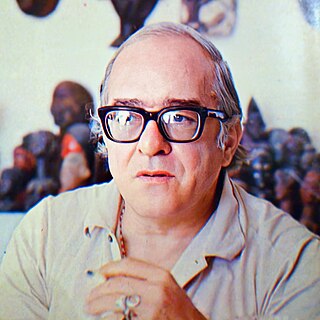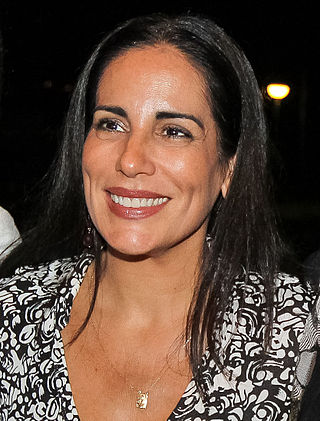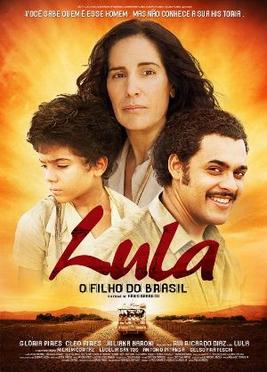Related Research Articles

Francisco Buarque de Hollanda, popularly known simply as Chico Buarque, is a Brazilian singer-songwriter, guitarist, composer, playwright, writer, and poet. He is best known for his music, which often includes social, economic, and cultural reflections on Brazil.

Hilda de Almeida Prado Hilst was a Brazilian poet, novelist, and playwright. Her work touches on the themes of mysticism, insanity, the body, eroticism, and female sexual liberation. Hilst greatly revered the work of James Joyce and Samuel Beckett, and the influence of their styles—like stream of consciousness and fractured reality—is evident in her own work.

Marcus Vinícius da Cruz e Mello Moraes, better known as Vinícius de Moraes and nicknamed O Poetinha, was a Brazilian poet, diplomat, lyricist, essayist, musician, singer, and playwright. With his frequent and diverse musical partners, including Antônio Carlos Jobim, his lyrics and compositions were instrumental in the birth and introduction to the world of bossa nova music. He recorded numerous albums, many in collaboration with noted artists, and also served as a successful Brazilian career diplomat.

Antônio Pecci Filho, better known as Toquinho, is a Brazilian singer and guitarist. He is well known for his collaborations, as composer and performer, with Vinicius de Moraes.
Beyond Citizen Kane is a 1993 British documentary film directed by Simon Hartog, produced by John Ellis, and first broadcast on Channel 4. It details the dominant position of the Globo media group, the largest in Brazil, and discusses the group's influence, power, and political connections. Globo's president and founder Roberto Marinho was criticised and compared to the fictional newspaper tycoon Charles Foster Kane, created by Orson Welles for the 1941 film Citizen Kane. According to the documentary, Marinho's media group engages in manipulation of news to influence public opinion.

Glória Maria Cláudia Pires de Morais is a Brazilian actress. She is best known for her roles in TV Globo telenovelas such as Dancin' Days, Vale Tudo, Mulheres de Areia and O Rei do Gado. She is also known for starring in films such as Academy Award-nominated O Quatrilho, box-office hit If I Were You and its sequel, and Lula, Son of Brazil, which is the second most expensive Brazilian film of all time, after Nosso Lar.

Diego Tardelli Martins, known as Diego Tardelli, is a Brazilian former professional footballer who played as a forward. He was considered a dynamic player due to his speed on attack and individual skills. Tardelli is not his last name, but his second name: it was chosen by his father after his footballing idol, Italian World Cup winner Marco Tardelli.

Moacyr Jaime Scliar was a Brazilian writer and physician. Most of his writing centers on issues of Jewish identity in the Diaspora and particularly on being Jewish in Brazil.

Arnaldo Antunes is a Brazilian musician, writer, and composer. He was a member of the rock band Titãs, which he co-founded in 1982 and left ten years later. After 1992, he embarked on a solo career. He has published poetry and had his first book published in 1983. He has worked with Marisa Monte, Tribalistas, and Carlinhos Brown.
Luiz Fernando Carvalho is a Brazilian filmmaker and television director, known for works closely linked to literature that constitute a renovation in Brazilian audiovisual aesthetics. He has already brought to the screen works by Ariano Suassuna, Raduan Nassar, Machado de Assis, Eça de Queirós, Roland Barthes, Clarice Lispector, Milton Hatoum, José Lins do Rego and Graciliano Ramos, among others.

Zuleika Angel Jones, better known as Zuzu Angel, was a Brazilian fashion designer, who became famous for opposing the Brazilian military dictatorship after the forced disappearance of her son, Stuart. She was also the mother of journalist Hildegard Angel.

Simone Bittencourt de Oliveira, better known as Simone, is a Brazilian singer of Música Popular Brasileira (MPB) who has recorded more than 30 albums.

Lula, Son of Brazil is a 2009 biographical Brazilian film based on the early life of Brazilian president Luiz Inácio Lula da Silva. Directed by Fábio Barreto, the film was released on January 1, 2010. Upon its release, Lula, Son of Brazil was the most expensive Brazilian film ever, with a budget of over 17 million reais, being later surpassed by Nosso Lar. The film was unanimously chosen by a Ministry of Culture commission as Brazil's submission to the 83rd Academy Award for Best Foreign Language Film, despite not having been chosen to compete.

The São Paulo Prize for Literature is a Brazilian literary prize for novels written in the Portuguese language and published in Brazil. It was established in 2008 by the Secretary of Culture for the State of São Paulo. Though not as old as other literary prizes in Brazil, such as the Machado de Assis Prize, the São Paulo Prize has quickly risen in prestige. For example, in 2011, there were 221 submissions for the prize. This rapid rise in popularity is partly because of the large cash prize. Every year two prizes of R$200,000 each are awarded—one for the best novel of the year by an established author, and the other for the best novel of the year by a debut author—making the São Paulo Prize the largest prize for a published work in Brazil, and one of the largest literary prizes in the world. Ten finalists are listed for each award, during the Festival da Mantiqueira, and the winners are announced on the first Monday of August in the Museum of the Portuguese Language.

Irreligion in Brazil has increased in the last few decades. In the 2010 census, 8% of the population identified as "irreligious". Since 1970, the Brazilian Institute of Geography and Statistics has included sem religião as a self-description option in their decennial census, for people who do not consider themselves members of any specific religion, including non-affiliated theists and deists. In the 2010 census, 8.0% of the population declared themselves "irreligious".

Demétrio Martinelli Magnoli is a Brazilian sociologist, PhD in human geography, writer and columnist. While in 2012, he was named by the Época magazine as one of the "New Right's shrill voices.", Magnoli considers himself a centre-left social-democrat.
Justiça is a Brazilian television series created by Manuela Dias. Its first season aired on Rede Globo from 22 August to 23 September 2016 at 11 pm. It was written by Manuela Dias, co-written by Mariana Mesquita, Lucas Paraizo and Roberto Vitorino, and it was directed by Isabella Teixeira, Luísa Lima, Marcus Figueiredo and Walter Carvalho, with general and artistic direction by José Luiz Villamarim.
"Retrato em Branco e Preto" is a Brazilian song composed by Antônio Carlos Jobim, with lyrics in Portuguese by Chico Buarque.

Angélica Freitas is a Brazilian poet and translator.

Escolinha do Professor Raimundo is a Brazilian escolinha comedy TV sketch and later TV show led by Chico Anysio and aired on various comedy shows for over 38 years. There, Anysio played Professor Raimundo, a teacher in charge of an adult education class.
References
- ↑ "'Leite derramado', de Chico Buarque, é o melhor livro de 2009 para leitores do site". O Globo . 28 December 2009. Retrieved 6 January 2010.
- ↑ MARCO RODRIGO ALMEIDA (29 May 2010). "Prêmio São Paulo de Literatura divulga finalistas". Folha de S.Paulo . Retrieved 6 April 2013.